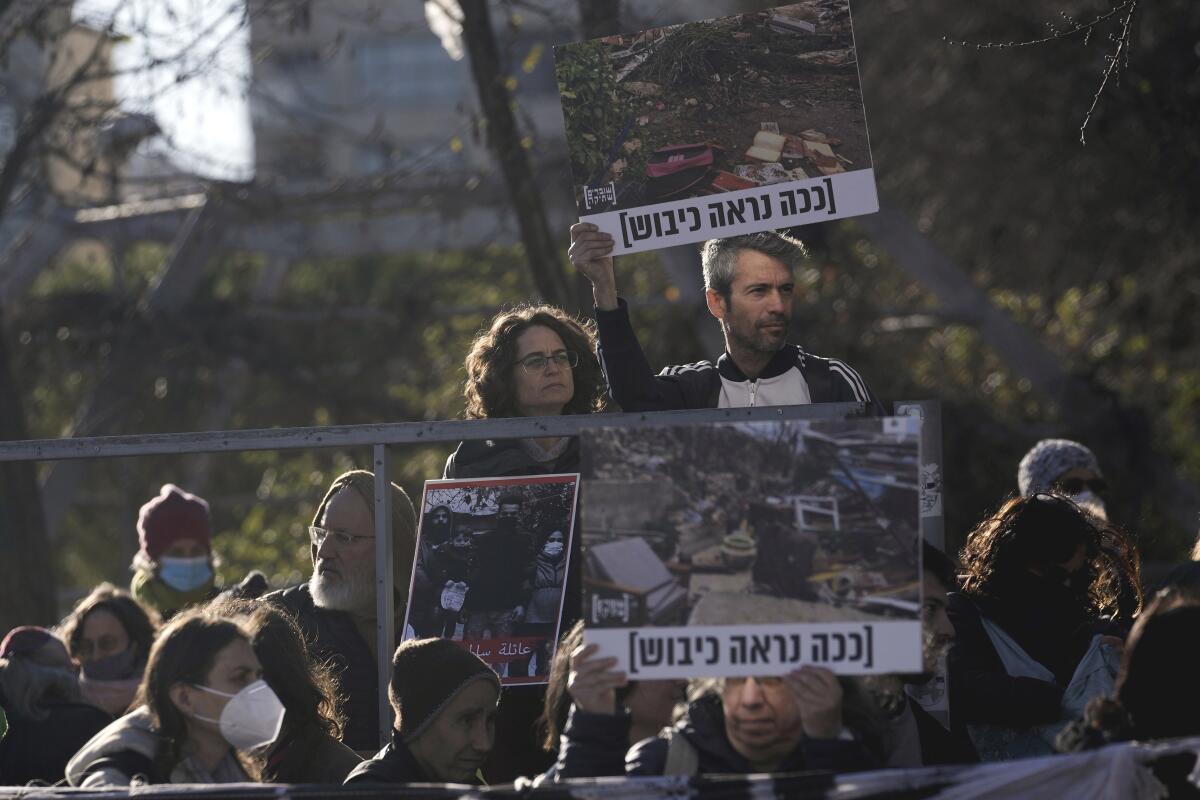Israel high court suspends Palestinians’ evictions for now

- Share via
JERUSALEM — Israel’s Supreme Court on Tuesday ruled that a group of families slated for eviction from a flashpoint east Jerusalem neighborhood can remain in their homes for the time being.
The ruling could work to ease tensions in Jerusalem’s Sheikh Jarrah neighborhood, which helped ignite the 11-day war between Israel and Hamas in Gaza last year.
The court ruled that the families can stay in their homes for now until Israel carries out a land arrangement, a process that could take years or may not be carried out at all, according to Ir Amim, an advocacy group that was not involved in the court case.
For the time being, the four families residing in the homes will be recognized as protected tenants. Each will deposit a largely symbolic rent amounting to $62 a month to a trust, until the property’s ownership is settled.
Sami Arsheid, a lawyer representing the families’ case before the court, said the decision was “something huge” that ran counter to the previous 63 rulings by Israeli courts on the issue of Palestinian properties in Sheikh Jarrah.
He said the court agreed that there’s a strong claim of Palestinian ownership of the property and that his clients “feel some relief that they are not going to be evicted from their homes.”
Dozens of Palestinian families in east Jerusalem are at risk of eviction by Jewish settler organizations, and thousands face the threat of demolition because of discriminatory policies that make it extremely difficult for Palestinians to build new homes or expand existing ones.
The properties in question were built on land that was owned by a Jewish community trust before the 1948 war surrounding Israel’s creation, the court documents say. After the war, when east Jerusalem was controlled by Jordan, Palestinian refugee families were settled in houses on the property. Israel took control of east Jerusalem in the 1967 Mideast war, and since 1972 settler groups have tried to claim the property and evict the Palestinian residents.
Israeli law allows Jews to reclaim property lost during the 1948 war but does not accord Palestinians the right to recover property they lost in the same war, even if they still reside in areas controlled by Israel.
Other threatened evictions in Sheikh Jarrah and other neighborhoods, which are tied up in decades-old legal battles between Palestinian residents and Jewish settlers, set off protests and clashes last year that eventually helped ignite the Gaza war.
The neighborhood is frequently the scene of violent clashes between Palestinian protesters, hard-line Israeli nationalists and Israeli police.
Israel captured east Jerusalem, along with the West Bank, in the 1967 Mideast war and annexed it in a move not recognized by most of the international community. Israel considers the entire city to be its capital, and the municipality says it is working to improve services for all residents.
The Palestinians want east Jerusalem to be the capital of their future state, and the city’s fate is one of the most divisive issues in the century-old Israeli-Palestinian conflict.
Also on Tuesday, the Palestinian health ministry said a 21-year-old Palestinian man was killed by Israeli troops near the West Bank city of Bethlehem. The circumstances of the incident were not clear.
The Israeli military later issued a statement saying soldiers identified two suspects near a West Bank settlement who fled when troops were dispatched to the scene.
The army said an initial review found the soldiers “used standard operating procedures, eventually firing at the suspects when they did not stop fleeing,” and that the incident was under investigation.
The military declined further comment.
More to Read
Sign up for Essential California
The most important California stories and recommendations in your inbox every morning.
You may occasionally receive promotional content from the Los Angeles Times.










